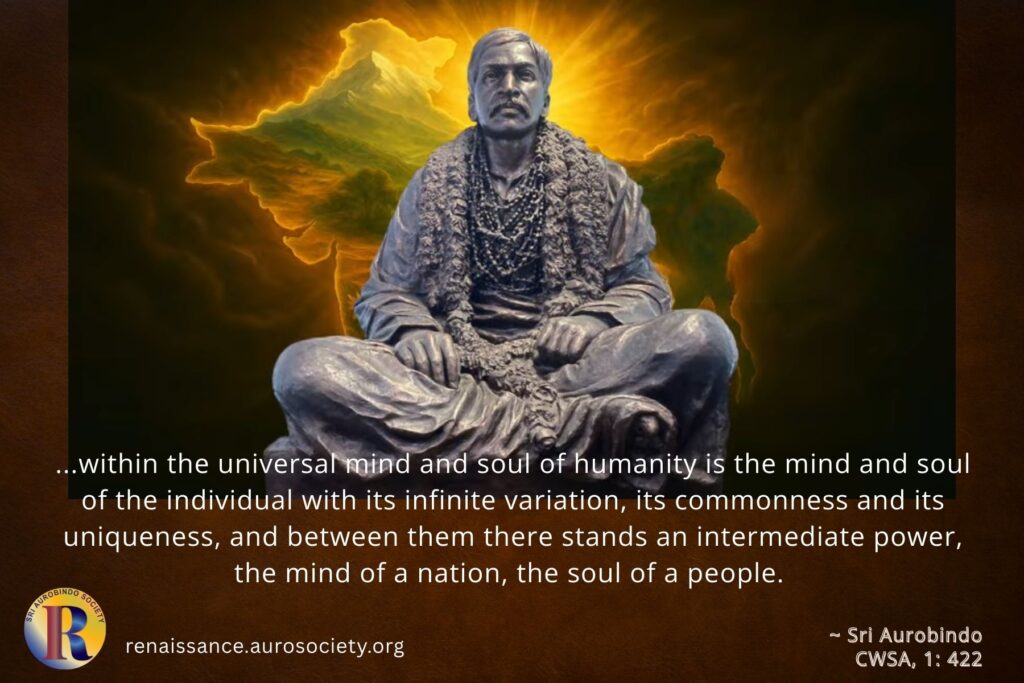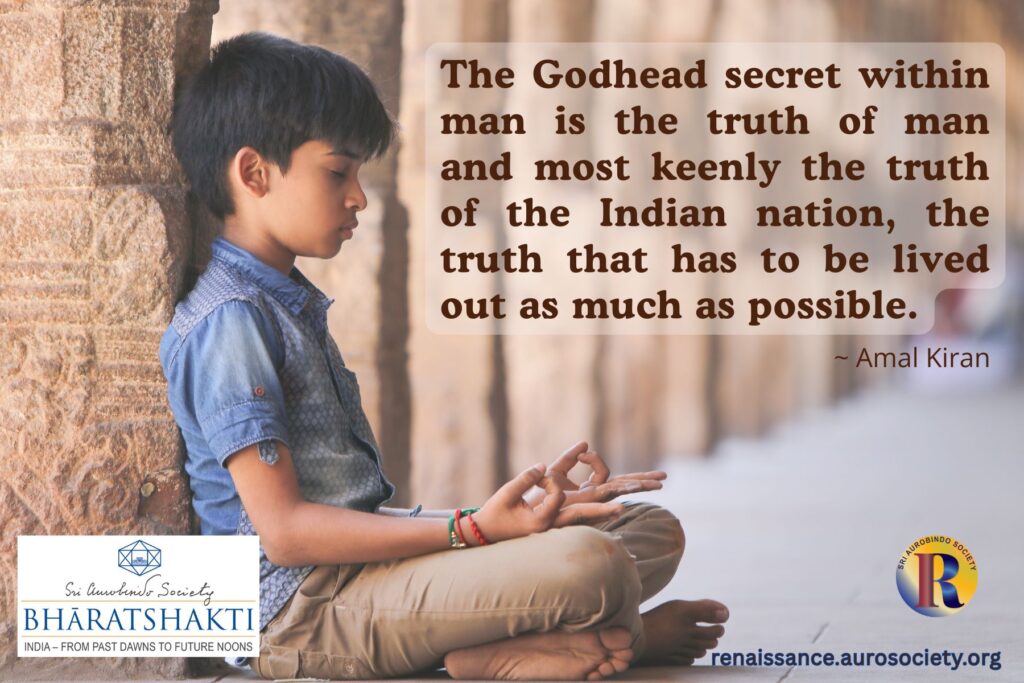Volume II, Issue 5
Author: K.D. Sethna (Amal Kiran)
Editor’s note: Earlier this month India celebrated Gandhi Jayanti. With India’s 75th year of political independence, we think it is timely to present an assessment of Gandhi’s role in the freedom movement. This assessment is done by one of the closest disciples of Sri Aurobindo, K.D. Sethna, a brilliant scholar, poet, philosopher and cultural critic, who was given the name Amal Kiran by Sri Aurobindo.
This article was first published in Mother India: Monthly Review of Culture, a journal of Sri Aurobindo Ashram which was edited by Amal Kiran for more than 50 years. All the editorials and articles which had any political theme or connection with the politics of the time were reviewed and approved by Sri Aurobindo himself. So was this essay by Amal Kiran. We present it here in two parts.
Given that our national mind now seems ready to evaluate and understand the role played by some of the leading personalities in shaping the post-Independence India, revisiting this article written in 1949, which has the approval of the Maharishi of our times, is highly necessary and relevant today. One may even say that it is a pressing demand of the time spirit.
In keeping with the Aurobindonian approach based on a higher spiritual principle, intellectually balanced, nonpartisan, and eschewing all forms of dogma and sectarianism, the editorials and essays in the journal maintained an objective but not neutral stance in its critical assessment of events and circumstances. We find the same approach in this assessment of Gandhi and his role in nation-building.

PART 1
In psychoanalytic practice there is a well-known method of testing our instinctive responses, plumbing our spontaneous idea-associations. A number of carefully chosen words are spoken to us and we have to blurt out without a moment’s thought the words that rise up in our minds. Well, if any Indian is psychoanalytically pelted with the term “Swaraj”, the rebound in most cases will be the name “Gandhi”.
You would say this is but natural. Yes, natural it is, since Gandhi stood in the forefront of the political scene here for the last three decades [1915 to 1948 since his death]. And yet the response, the association is wrong. There would be the right response and association if there were the mention of a leader like Tilak who bent his whole leonine energy towards the attainment of Swaraj, who was a Swarajist first and last, who had no other life-passion than to free India from the British and who considered all means legitimate in breaking the fetter of foreign domination.
With Gandhi, Swaraj was never the be-all and end-all. No doubt, he wanted India to be politically independent, but never unconditionally, never by any kind of means. Either certain conditions must be observed by us, certain means adopted, or else no Swaraj was to be desired and worked for. There was in Gandhi’s vision an ideal which seemed to him larger than India’s political freedom — and that ideal was what he strove after and sought to represent: if Swaraj could be subsumed under that ideal, if it could attune itself to this “greater glory”, then alone was it worth having!
Not Swarajist but Humanist
Gandhi was not first and last a patriot or a politician. He was above everything a moralist and humanist. What was his charge-sheet against the British rulers? A patriotic politician would announce that even if there were nothing to hold up against British rule on the score of moral or humane conduct, self-government would still be the goal: it must be won for its own sake because it is an inalienable right of every nation. Gandhi’s attack on British imperialism was not essentially on the ground that India must be governed by Indians. It was rather on the ground that England had misgoverned India.

If the British sovereignty had really been what it claimed to be — maabaap raj, fatherly and motherly rule — it is questionable indeed whether Gandhi would have launched into politics. He was at heart a champion of the down-trodden and the ill-treated, and his main accusation against John Bull was not the foreignness of the fellow but the crudity of the chap. And it is characteristic of Gandhi that, while not forgetting the political misdeeds, he gave prime place on his black list to the misdeeds that were economic.
After the first World War, he did not mention as the chief blot on British rule the Rowlatt Act, the Jallianwalla Massacre, the broken promise of the British Premier to the Muslims of India and the sham unsatisfactory reforms. He mentioned in words of the intensest fire and the most glaring light the appalling poverty which was the result of systematic exploitation of our masses by the British.
In the celebrated trial in which he showed the causes of his disaffection for the Government, this deliberate impoverishing of the bulk of his people, this continual and cold-blooded degrading of millions below the bare subsistence level in order that a few might wax rich was declared to have principally alienated him from his masters. Even more characteristic of him was his grouping together with the crime of his masters the crime of his own countrymen who shared the exploiter’s mentality and never scrupled about grinding the faces of the poor.
The passage is memorable, for in it is summed up the real Gandhi: “No sophistry, no jugglery in figures can explain away the evidence, the skeletons in many villages, present to the naked eye. I have no doubt whatsoever that both England and the town-dwellers of India will have to answer, if there is a God above, for this crime against humanity which is perhaps unequalled in history.” (Great Trial of 1922)
The castigation of the Indian exploiters, and not solely the British, is a clue that leads us straight to his most humanitarian campaign, the one against untouchability — a campaign whose thrust was at the Indian though the foreigner also was taken to task for setting up a separate electorate for the Untouchables and thus perpetuating them as a class.
Gandhi’s battle with conventional India ran parallel to his battle with John Bull. He solemnly thought his country deserved to be tyrannised over by the British because of the heinous sin she had committed for centuries against so many millions of her own people by looking down upon them as pariahs, as outside the pale of social intercourse, as worse than beasts of burden. Unless we set about putting our own house in order we are not fit to be free: this is what Gandhi said time and again.
Never did he spare his countrymen the scorpion whip: he lashed them without fear, he stung them relentlessly into consciousness of guilt. He was no flatterer: he did not play up to his audience: he was a just and bold critic of India. Even about the scurrilous book by Miss Mayo he said that it was a book Englishmen should put out of their minds but Indians must take to heart, for though it was in many respects a malicious exaggeration with not half a glance to spare for the good side of our land, it did drive home a few facts, a few truths. And the worst fact, the most painful truth about us was, in Gandhi’s eyes, untouchability.

To remove the bar sinister of the untouchables was to be our duty side by side with removing the yoke of the Britisher, who was inclined to treat us as untouchables. “Fail in this moral and humane duty,” said Gandhi in effect, “and you do not merit to be set free. Social reform must go hand in hand with work for Swaraj: without social reform Swaraj is not worth a straw!”
Can Non-violence be the Master Ideal?
Nor is the attack on the pariah system the sole distinguishing mark of Gandhi being basically something else than an embodiment of Swarajism. There is the insistence, in season and out, on non-violence, ahimsa. According to him, we simply had to oppose the British for the economic as well as political chains put on us by them, but the chains had to be snapped in the right way and not the wrong. The moment we chose the wrong way we would forge worse chains for ourselves and it would be much better to endure the lesser evil than create the bigger.
A man is truly man, in Gandhi’s view, when he restrains himself and not when he retaliates. We must fight without rancour and without staining our hands with brute force. Every injustice has to be combated but unto one’s own death, never unto the death of one’s opponent. Blood must be spilled for a noble cause, but it must be our own blood. One remembers how at the height of his Civil Disobedience Movement in 1922, with the entire nation steeled to resist the British Government and bring the proud rulers to their knees, Gandhi cast away the prize nearly in his hands and stopped the campaign just because at Chauri Chaura the populace, inflamed by armed police repression, ran amuck and committed a few acts of gruesome violence.
This sudden drawing of reins by Gandhi brings out sharply the fact that as a politician he was not always the master-guide. What he did in 1922, like several other acts in his career as India’s leader, was, from the political standpoint, short-sighted; he might have striven to check further violence without stemming the enthusiastic tide of nationalism and frustrating the highly wrought millions he commanded. Besides, the too acute recoil from violence of any kind is a dangerously confusing emotion, in a world where there are so many diabolic presences.

The inadequacy of the dictate to abjure violence was most revealed when in the last war [World War II] Gandhi advised England to fling off arms and melt Hitler’s heart by letting him ride roughshod over her. Its defect was laid bare again with terrible vividness when he talked of India fighting the Japanese invader with non-violence. He did not realise the threat to world-civilisation by the Fascist maniacs and how limited and ineffective complete non-violence would have been against their blind brutality.
Beglamoured by his own pet doctrine, he could not see the Inferno that was the heart of Fascism and thought that here was only another form of the imperialistic ambition which had marched through history so often and which was never quite impervious to the influence of heroic self-sacrifice and passive resistance on its opponent’s part. Many Indians committed the same mistake, but except the taking up of arms on behalf of Fascism nothing could have been more Himalayan a blunder than the pitting of ahimsa against a Hitler.
CONTINUED IN PART 2. . .

Read more on Gandhi’s moral nationalism HERE.
~ Graphic design: Beloo Mehra
~ Cover image: Gandhi drawing by Bindu Popli



